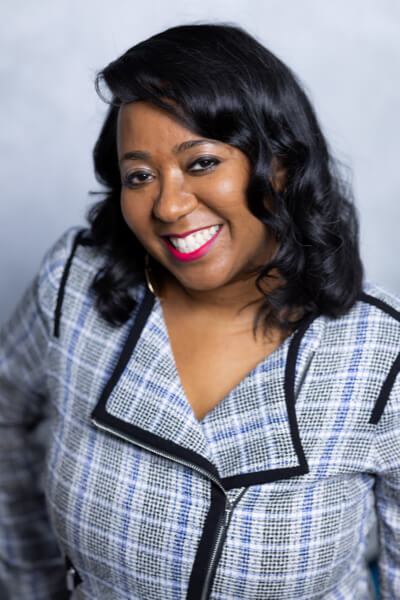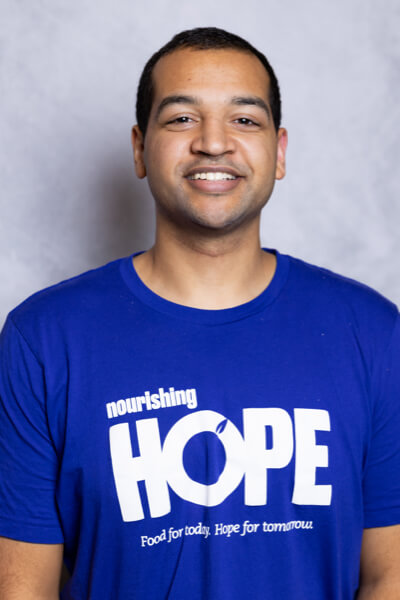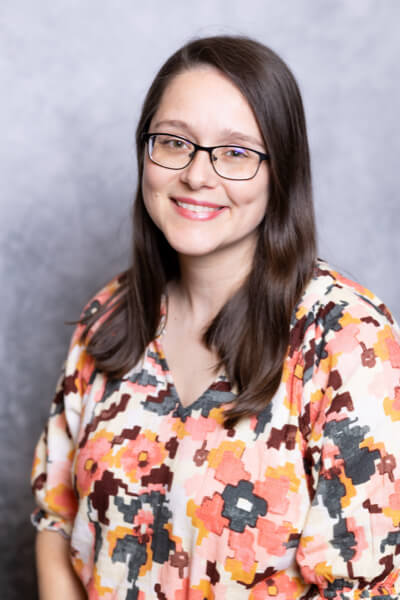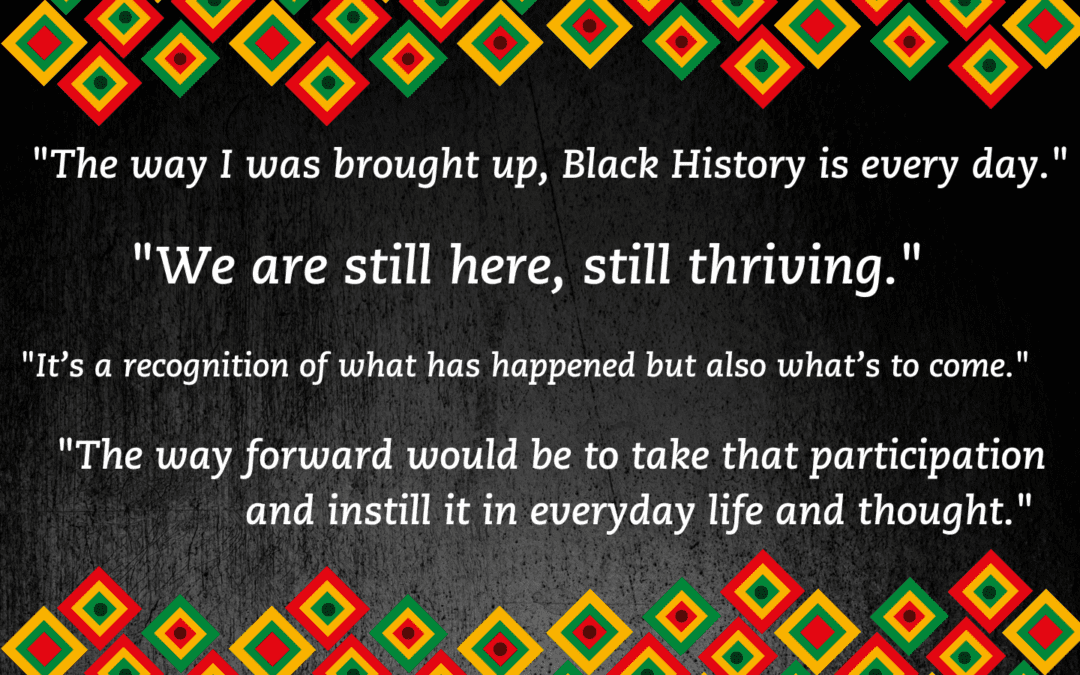Each year, Black History Month presents an opportunity to reflect on and celebrate the vast and remarkable achievements of Black people throughout the years.
Officially designated in 1976, Black History Month is also a time for recognition of both the progress made and the work yet to be done toward racial justice.
We asked four of our colleagues at Nourishing Hope what Black History Month means to them, particularly in light of ongoing systemic racism in Chicago and across the country. We’re grateful to them for sharing their honest and thoughtful perspectives.
The following remarks have been lightly edited for length and clarity.
Keenya Lambert, chief development officer
 I enjoy Black History Month more now that I’m a parent. And especially seeing it through the lens of my daughter, Leliah, who’s 10.
I enjoy Black History Month more now that I’m a parent. And especially seeing it through the lens of my daughter, Leliah, who’s 10.
Most parents know, you’re always looking for places for your kids to connect, activities for your kids to do, especially on the weekend. And so … not only do we have an activity, but we also an opportunity for her to learn about her culture, and also inspire her at the same time in her journey as a young black girl who is interacting with the world and how she sees it and how the world sees her.
My daughter will tell you that I’m adamant about supporting local Black businesses. It’s important for her to understand why. To think about what has happened and how can we make our future different from our past? And I think of things such as: What are corporations doing to ensure that there are opportunities for lending within communities that have been historically discriminated against? What can we do to change that narrative? We want to build more Black businesses in the community but we have to have more lending to do that.
So this month is very special because it’s a recognition of the past but also what’s to come. And the possibilities of what we can do if we work together. And so, I don’t think of it as a month for Black folks across the nation to feel bad about our journey to America in any way, but more a celebration of how much we’ve been able to overcome — and the possibilities for our descendants, the world in which we want them to live in, and that possibility lives in hope.
If anyone takes a look at my resume, it is steeped in helping people. And those values and that path started as a kid. I grew up in the Black church. And that entity is very philanthropic. Not only in revenue but also in time, and caring for people, and loving people. I went to school and received degrees in nonprofit management, but my roots are in the Black church. I learned to be a fundraiser in the Black church.
So understanding that we are responsible for each other — that seed was planted as a kid. That’s always been a part of my life.
My sister and I are first-generation college students and also graduate students in our family. That’s important because neither of our parents graduated from college but they laid the foundation for us to do so. Our parents were very focused on us being able to give back and be the next generation that has more resources available to them.
I hope the same for my daughter — that she has more resources available to her.
To be honest, there are days when you just want to go home and shut out everything and reset. But if we want to create change, we have to be that change agent. And that doesn’t mean we sit on the sidelines. I don’t believe in that at all.
My hope is that in my work here at Nourishing Hope that I am able to bring resources to Chicago communities, especially to the South and West Sides, that allow people to have economic mobility on their journeys. I see Nourishing Hope as being on the very frontlines of helping people in crisis, helping them stabilize their lives. And once they’re stabilized, they can move on to other organizations that can help them on their pathway out of poverty into job readiness, home ownership and entrepreneurship.
Natia Barnett, program expansion manager
 The way I was brought up, Black History is every day. Black History Month — the way I see it, honestly — is for other people outside of the Black culture. To have the opportunity to look at what Black people have contributed to the history of the United States.
The way I was brought up, Black History is every day. Black History Month — the way I see it, honestly — is for other people outside of the Black culture. To have the opportunity to look at what Black people have contributed to the history of the United States.
There was one thing that started to go around and it was like a list of Black inventions. And I was so happy when that was going around because it exposed people to Black scientists. There have been brilliant Black scientists for centuries!
I think when some people think about Black people there’s this one rigid group that they put us in: ‘Black people are bad. They’re drug addicts and thugs.’ And it’s like: What about the heart surgeons? What about the guy who … you eating a peanut butter sandwich? Let me tell you why. (laughing)
In the early 2000s, I decided to move my family to the northern suburbs, Vernon Hills. I just had the opportunity and I went. That created a whole different point of view for my children. (Previously) we lived in Chicago in a primarily Black neighborhood.
My son Nathan took a stand. And he did it on his own. He went to Vernon Hills High School, which was at the time 20 years old. And as I said, we celebrate Black History every day. But Black History Month came around — he transferred there his sophomore year of high school — and he was like, ‘Mom, they don’t do anything for Black History Month. Matter of fact, there’s no Black anything. There’s only a handful of us but you’d think for Black History Month, they’d do something.’ So he and a small group of Black students formed the first Black student union there.
The next February came around and that school celebrated Black History Month.
We essentially take care of each other. And I think throughout history, that’s something that is undeniable.
Who I am is greatly due to my ancestors and to the people who taught me. I did go to schools that were heavily based in Black history and in Black thought and in Black love.
Black history has truly made me very proud, very brave, very resourceful and armed with the knowledge that my people have been through so many things and we are still here, still thriving.
A lot of times, people feel like being forgotten is part of being Black. Not having resources and opportunities is part of the Black experience, right? So when I had the opportunity to come to Nourishing Hope, especially when I knew exactly what they were doing, what resources were available, and how Nourishing Hope offers it — in this beautiful way, full of love, and there’s real life giving behind it. It’s truthfully a group of people with heart who want to extend love and compassion.
Who I am comes with a responsibility and that responsibility is to take care of my people.
We are nurturers, especially Black women. And it could just be from a history of having to overcome. Having to be resourceful. Having to figure it out. Having to make a way out of no way.
So now it’s just a habit passed on through generations: solving problems and loving folks. Like my grandmother did. Like my momma did. Like I’m trying to do. I hope my daughters do the same — and my son.
Isaiah Boaz, volunteer engagement coordinator
 The most important thing to me is taking the time to commit to learning something new. Whether it’s part of your history or someone else’s, committing to that idea to learn something new and trying to understand it.
The most important thing to me is taking the time to commit to learning something new. Whether it’s part of your history or someone else’s, committing to that idea to learn something new and trying to understand it.
I think that’s my real takeaway, from times like Black History Month, is to take that commitment to try to understand something, to learn something new, and use that time to grow.
I am fortunate enough to have a father that had a career in dealing with diversity, equity, and inclusion and he’s dedicated really his entire career to that work, but he has also dedicated his life outside of his career to that as well, in terms of his reading, the people that he engages with, the way that he speaks to other people and also the way teaches others.
One of the things we would do when traveling is he would take me to a lot of different college campuses and universities. Specifically what he would do is take me to HBCUs, historically Black colleges, and universities. The reason for that was to show that the opportunity is there. Maybe these schools aren’t the ones that you are hearing about all the time, they may not have the most money, but they are still here and still doing what they set out to do.
Whether it’s Black History Month or Women’s History Month, I think it requires more of a more active mindset. A lot of times in my experience it feels more like a checkbox than an active participation.
Black History Month in general is a great starting point for people to gain that agency and participate.
I think that the way forward would be to take that participation and instill it in everyday life and thought. That feels like the only way for change to really happen — when it seeps through and becomes ingrained in your thought rather than something that has to be delivered to you.
Relatively recently, I was talking to a colleague about my family history. I grew up in Ohio, and most of my immediate family is from northwest Ohio. But prior to that, it’s very easy to map our family history, at least on my dad’s side, in America. My family was, essentially, a participant in the Great Migration.
I’ve always found it interesting, mapping that journey of a whole people. The first wave started with World War I. There was a lot more need for workers and factories that were participating in the military effort. This was kind of the first wave of Black people in the South where they didn’t have much money or agency and now they were hearing of you know different wages and different lifestyles in these other cities and a lot of them were taking their whole families, risking a lot to completely change their lives.
Specifically, in Chicago, a lot of people came here and settled in the South Side and a lot of those families are still on the South Side today. Thinking of it that way and understanding the history of Chicago here, where a lot of our Black population came from, where they settled, and then seeing today that there’s still a lot of Black people in the same area, struggling, I think tells a story in itself.
I think it’s an important connecting point to hold onto because we’re not that far removed from that history.
Carrie McCormack, senior coordinator of client experience
 I was raised in a mixed-race household. I have family members who are people of color and growing up we would talk about Dr. King’s message about how we’re all brothers and sisters and we need to look out for each other. I’m a first-generation college student and when I was in college I was on our MLK Day committee and every year we would have a celebration.
I was raised in a mixed-race household. I have family members who are people of color and growing up we would talk about Dr. King’s message about how we’re all brothers and sisters and we need to look out for each other. I’m a first-generation college student and when I was in college I was on our MLK Day committee and every year we would have a celebration.
I also got to meet Fred D. Gray, who was Dr. King’s personal attorney, and he was around 70 at the time that I met him in school. It was kind of wild to meet this person who was part of that Civil Rights era. It’s interesting to see that history, as they say, is not ancient history.
Growing up in my household we were always taught not to judge anyone if they look different than you, or if they have less than you, or if they are living with a disability. Everyone has something to share and deserves to be their unique self and bring their own flavor to the conversation.
I hope I’m being a good ally by listening and trying to understand other people’s perspectives so that we can have a more collaborative place to live and be.
Nourishing Hope has always been aware that historically there was a particular type of person who volunteered for us. We saw that our volunteer demographic tended to be older, white, and typically female. (Editor’s note: Nourishing Hope was founded as Lakeview Pantry in 1970, primarily serving Chicago’s North Side until growth and expansion in more recent years to serve the whole city.)
There’s a lot more variety now in our volunteers — their ages, backgrounds, everything honestly. We’ve become an organization that people want to volunteer at. This makes it a better experience for our clients and community members. We want to be a community serving the community and that makes me really happy.
At Nourishing Hope we use the words ‘dignity’ and ‘respect.’ So one of my personal goals is to figure out how that manifests. What does that look like? What words do we use? How do we welcome people? How do we make all of our neighbors feel at home?
